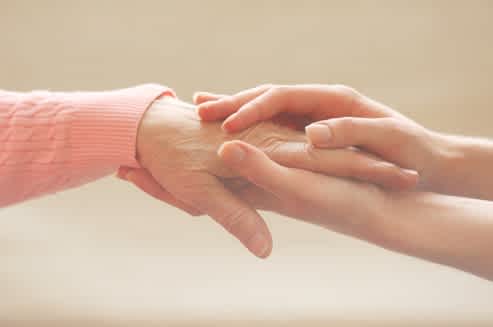4 Myths about Hospice

Since 1977, Capital Caring’s physicians, nurses, aides, social workers, counselors, and volunteers have provided compassionate hospice care to more than 110,000 moms, dads, and kids throughout the mid-Atlantic region living with advanced illness. Each of us have answered our own personal and professional calling to care for those facing the end of their journey in this life, and we consider it a blessing to join them in that journey. As we celebrate our 40th anniversary, however, we still find a lack of awareness about services, like hospice care, that exist to provide support to those who are leaving this world and to their loved ones. With a natural reluctance inside each of us to think about, let alone discuss, the eventual need for these services, it is understandable that certain misconceptions about what hospice care is – and what it is not – persist amongst so many people.
Unfortunately, the misconceptions about hospice care not only deter those in need from seeking the critical support hospice provides, but they also discourage those who may benefit from hospice support in the future from educating themselves about its benefits well before it is needed. The journey toward a better understanding of the true nature and benefits of hospice begins by addressing and dispelling widespread myths associated with this unique form of care. Some of the most commonly held misconceptions include:
Myth: Hospice is a place
Fact: Hospice care is not a place, but rather a type of comprehensive, patient/family-centered care that offers expert, compassionate medical care, multidimensional pain and symptom management, and other emotional, spiritual, and practical support to individuals living with an advanced progressive illness. This type of care can be offered wherever the patient calls home, whether a personal residence, long-term care community, assisted living facility, nursing home, inpatient unit, hospital, or wherever the individual is most comfortable.
Myth: Hospice means giving up
Fact: Choosing hospice does not represent a decision to give up hope or the desire to continue living a fulfilling life. On the contrary, hospice care helps patients and families cope with and understand what is happening at life’s later stages on their own terms. Above all else, hospice emphasizes pain and symptom management, rather than curative treatment, to maximize patient comfort, dignity, and empowerment, in an effort to promote the highest quality of living.
Myth: Hospice is just for the patient
Fact: Hospice care is designed to treat the person, not the disease, and it considers both the patient and their loved ones as the central unit of care. Achieving the highest quality of life for both the patient and their caregivers is one of hospice care’s highest priorities. The core members of the hospice interdisciplinary team, primarily comprised of a hospice physician, nurse, social worker, chaplain, certified nursing assistant, bereavement counselor, and volunteer, among others, assist patients and their loved ones in achieving their medical, spiritual, and emotional goals. The earlier hospice care is initiated, the greater the opportunity to address specific needs of patients and their caregivers.
Myth: Hospice is only for cancer patients
Fact: Hospice provides care and support to individuals of all ages and at any stage of a life-limiting illness. Ultimately, hospice means “care,” which is exactly what we provide at Capital Caring. Our 40th anniversary gives us the chance to reflect on all the lives we have touched since our founding, including the lasting memories we have created and the treasured moments we have helped to facilitate between family members. Our mission, “to simply improve care,” is what stirs my heart and drives my passion every day to do more for those already under our care and for the countless others living with advanced illnesses who do not yet know of the comfort and compassion we provide.